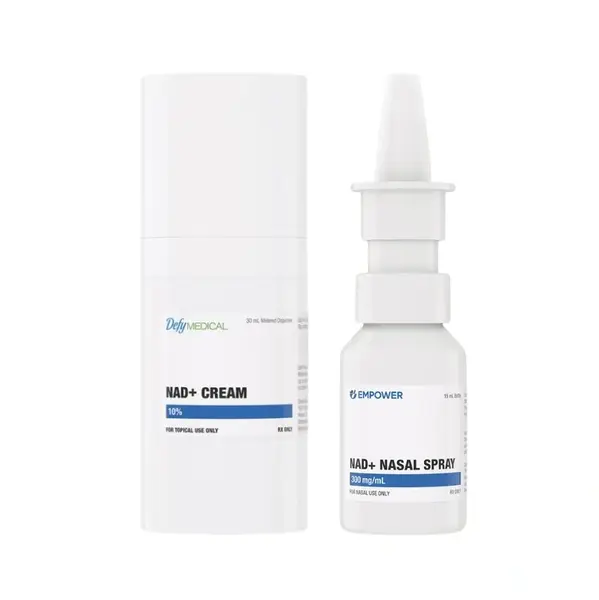NAD+ (Nicotinamide Adenine Dinucleotide)

NAD+ (Nicotinamide Adenine Dinucleotide)
Benefits of NAD+ (Nicotinamide Adenine Dinucleotide)
- Increased Energy Production: NAD+ is essential for converting nutrients into ATP, the cellular energy currency, leading to improved energy levels.
- DNA Repair: It plays a vital role in repairing damaged DNA, which is crucial for preventing cellular aging and disease.
- Improved Cellular Function: By supporting cellular metabolism and repair, NAD+ contributes to overall improved cellular function.
- Enhanced Cognitive Function: Some studies suggest that NAD+ may improve cognitive function and protect against neurodegenerative diseases.
- Cardiovascular Health: It may contribute to improved cardiovascular health by supporting healthy blood vessel function and reducing oxidative stress.
- Metabolic Health: NAD+ can play a role in improving metabolic health, including insulin sensitivity and weight management.
- Increased Longevity: By supporting cellular repair and function, NAD+ is believed to play a role in promoting healthy aging and potentially increasing lifespan.
- Muscle Function: NAD+ is important for muscle function and may help to improve muscle strength and endurance.

Medication Information
Mechanisms of Action
While the precise ways NAD+ supplementation benefits health are still being investigated, research suggests it may play a role in healthy aging, age-related diseases, metabolic disorders, and addiction. NAD+ replenishment is thought to counteract the age-related decline of NAD+ and its precursor, NMN, primarily caused by the enzyme CD38, thereby maintaining mitochondrial function and energy production. However, NAD+ also influences various other metabolic pathways through NAD+-dependent enzymes.
These enzymes include PARPs, which are crucial for DNA repair; CD38 and CD157, involved in cell signaling; sirtuins, which regulate cellular metabolism and stress responses, and have been linked to longevity; and SARM1, implicated in neuronal aging. Research on progeroid syndromes, particularly Werner syndrome (WS), has shed light on NAD+’s role. WS, characterized by premature aging and metabolic dysfunction, is linked to a deficiency in the WRN gene, which affects NAD+ production. Studies have shown that NAD+ depletion in WS leads to impaired mitophagy (mitochondrial recycling), and NAD+ replenishment restores mitochondrial function, reduces oxidative stress, and extends lifespan in animal models.
Furthermore, studies on cells overexpressing CD38, an enzyme that degrades NAD+, show mitochondrial dysfunction and reduced energy production. Conversely, in CD38-deficient animals, NAD+ levels and mitochondrial function remain stable with age. These findings reinforce the importance of NAD+ in maintaining mitochondrial and metabolic health.
Storage
Store dry powder at 68°F to 77°F (20°C to 25°C) and away from heat, moisture and light. Once reconstituted keep this medicine in a refrigerator between 36°F to 46°F (2°C to 8°C). Keep all medicine out of the reach of children. Throw away any unused medicine after the beyond-use date. Do not flush unused medications or pour down a sink or drain.
